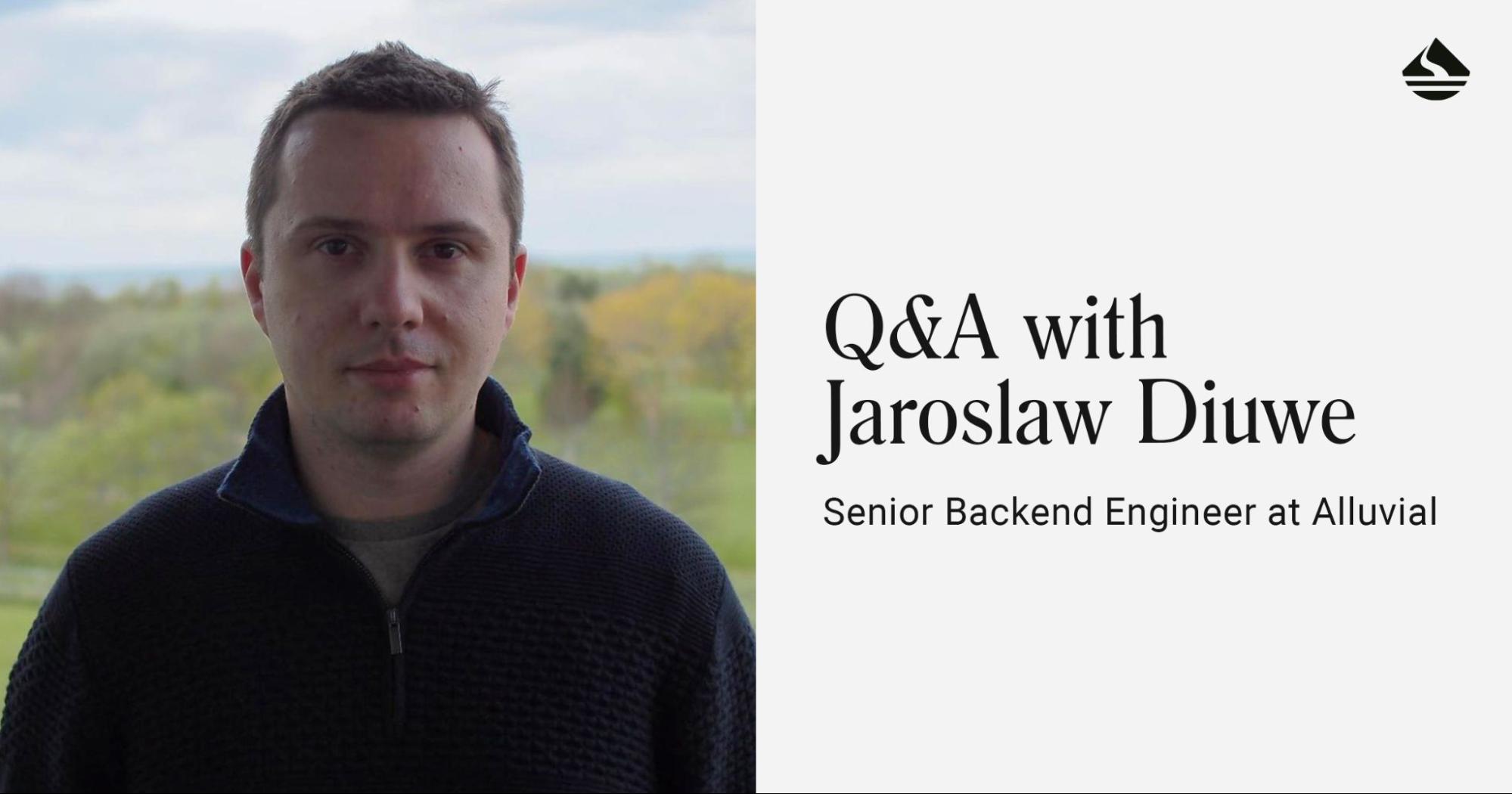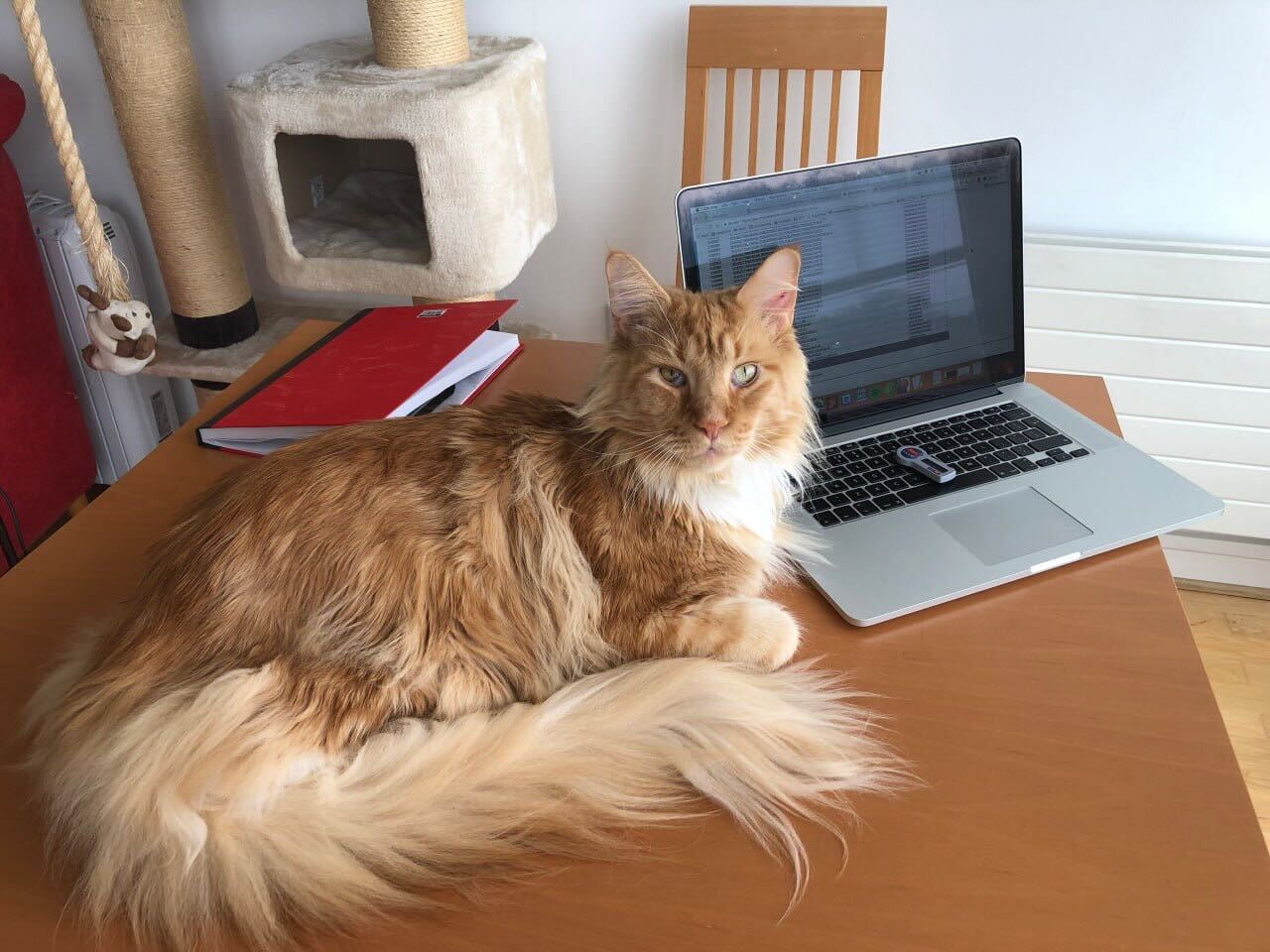Q&A with Jaroslaw Diuwe, Senior Backend Engineer at Alluvial
We discuss Jaroslaw's insights into the differences between web2 and web3 engineering, what success means in a backend project, his thoughts on collaboration, and more.

Hi, Jaroslaw! Tell me a little bit about your professional background, and your experience in software engineering.
I began my journey in IT in 2011 while pursuing my Computer Science degree in college. Initially, I worked as a Systems Engineer for large tech firms, gradually transitioning into software engineering roles. An internship opportunity at Oracle, following its acquisition of Sun Microsystems, steered my career towards a System Engineering role. I continued down this path for five more years at IBM.
In 2017, I embarked on a new chapter at Salesforce, coinciding with my growing passion for Go programming—a skill that has since become indispensable to my work. I completed my Masters Degree while working full time. Subsequently, my 2 year long experience at Huawei's R&D department further solidified my software development capabilities.
In 2021, I decided to switch gears completely and transitioned into the dynamic world of crypto startups, where I continue to leverage my diverse experience in software engineering to contribute to innovative blockchain technologies.
“The spark for my interest in crypto stemmed from the profound innovation and disruption that blockchain offers. I saw it as a transformative opportunity to enhance traditional financial systems.”
How did you get started in blockchain development? And what was that ‘spark’ for your interest in crypto?
My journey into blockchain development began during the crypto bull run of late 2017. While I had heard about Bitcoin and Ethereum before then, my initial attraction was towards trading altcoins. However, it wasn't until 2021 when I joined Blockdaemon as a Golang Engineer that I delved deeper into blockchain technology.
The spark for my interest in crypto stemmed from the profound innovation and disruption that blockchain offers. I saw it as a transformative opportunity to enhance traditional financial systems. Additionally, the core principle of decentralization and the concept of decentralizing trust resonated deeply with me. These factors ignited my passion for exploring and contributing to blockchain technology.
What are your primary responsibilities as a Senior Backend Engineer, and what are you most excited to be working on at Alluvial?
As a Senior Backend Engineer at Alluvial, my primary responsibilities revolve around enhancing and expanding the Alluvial API. This includes developing new features, optimizing existing functionalities, and building critical services like blockchain indexers. I also devote significant time to code reviews, crafting technical designs for upcoming features, and collaborating closely with team members.
What truly excites me about being part of Alluvial is our mission to foster the growth of the liquid staking ecosystem, making it more secure and appealing to institutions and enterprises in the market. I look forward to contributing to this innovative space and helping Alluvial achieve its ambitious goals as we continue to evolve and expand.
“Success in a backend project means having a design that's easy to understand, explain, and maintain. For blockchain projects, which are often complex, simplifying this complexity improves code quality and makes maintenance easier.”
You have deep experience working in Engineering both at large-scale web2 companies, including IBM and Salesforce, and in crypto companies. In what ways does working as an Engineer differ from web2 to web3?
You're right—I've worked extensively in engineering at large web2 companies like IBM and Salesforce, as well as in the crypto space. This varied experience has exposed me to diverse technologies and cultures, sharpening my problem-solving skills and expertise.
Moving from web2 to web3 involves significant changes. Web3 platforms are decentralized, requiring different approaches to system and application design. Blockchain plays a central role, relying on smart contracts and event logs. This shift demands a new mindset when building applications.
In web3, backend engineers need deeper domain knowledge and must stay updated on trends, Ethereum proposals, and standards. This differs from web2, where backend development was often less integrated with business aspects. Web3 requires engineers to understand how their work impacts the broader product or platform. This evolving landscape demands continuous learning and adaptation.
What does success look like for a backend project? How does your work support secure and scalable systems?
Success in a backend project means having a design that's easy to understand, explain, and maintain. For blockchain projects, which are often complex, simplifying this complexity improves code quality and makes maintenance easier.
A critical aspect of success is creating a seamless connection between onchain and offchain data. This bridge between backend systems and blockchain data is essential for scalability and security.
In my work, I focus on reducing complexity, improving maintainability, and establishing strong connections between different data environments. This approach helps build secure and scalable backend solutions that can adapt to future needs.
One of Alluvial’s core values is collaboration. In your role as Senior Backend Engineer, how do you leverage collaboration to help ensure the systems you’re building meet enterprise-grade standards, either internally at Alluvial or with our partners?
My role demands a high level of autonomy and responsiveness to our business needs. I collaborate daily with our engineering and infrastructure teams, engaging in frequent knowledge-sharing and brainstorming sessions to align our efforts effectively.
I also work closely with the product team to align our engineering efforts with the product roadmap and feature priorities. It's essential to not only grasp the immediate requirements presented to us but also to anticipate the long-term growth potential and future needs anticipated by the business and product teams.
This holistic understanding influences our engineering approach when designing new features, ensuring that our solutions are not only robust for the present but also scalable and adaptable for future demands. By fostering this collaboration, we align technical decisions with business objectives and deliver solutions that meet enterprise standards effectively.
What inspires you, or helps you stay motivated when working through a difficult project?
When facing a challenging project, I believe in breaking it down into manageable tasks that can be tackled independently by different team members. This approach allows us to celebrate small achievements along the way while keeping the larger objective in focus.
Inspiration for me can be found anywhere—whether it's from something I read online, a podcast, or simply through conversations and brainstorming sessions with colleagues. Sometimes, I find it helpful to disconnect completely, listen to music, and let creativity flow naturally.
“So in peace our task we ply,
Pangur Bán, my cat, and I;
In our arts we find our bliss,
I have mine, and he has his.”
— Pangur Bán
I’ve heard you have a cat with an award-winning lineage. Is this true?
Thank you for asking about my cat! Pangur will be thrilled to hear he's getting attention. He's an 11-year-old Maine Coon named Pangur, inspired by the Irish poem 'Pangur Bán.' His father was quite accomplished, boasting dozens of awards, and I've heard he was the largest Maine Coon in Ireland at the time, weighing in at around 11 kilograms.

Anything else you’d like to share?
Thank you for allowing me to introduce myself and discuss my experiences.
Of course! Thank you, Jaroslaw!
Interview by Melissa Nelson
Please note
Liquid staking via the Liquid Collective protocol and using LsETH involves significant risks. You should not enter into any transactions or otherwise engage with the protocol or LsETH unless you fully understand such risks and have independently determined that such transactions are appropriate for you.
Any discussion of the risks contained herein should not be considered to be a disclosure of all risks or a complete discussion of the risks that are mentioned. The material contained herein is not and should not be construed as financial, legal, regulatory, tax, or accounting advice.